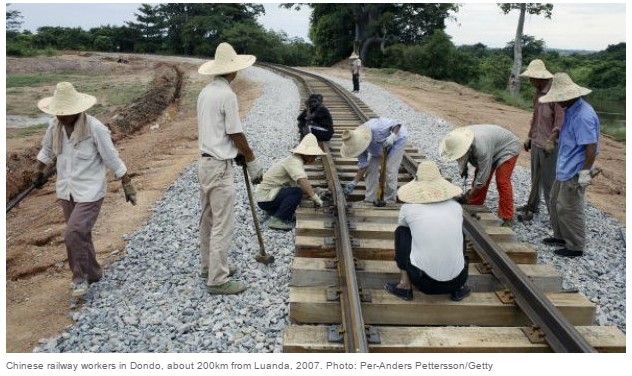Take a stroll down an alleyway of Angola’s capital Luanda, and it will be impossible to miss Beijing’s influence. There is construction site written in Chinese scripts; then there is the restrictively expensive Chinese restaurant and not to mention the massage parlors with a strict ‘Asian-only’ policy.
While economists might argue that Angola needs Beijing’s fat pockets. The many Angolans walking up and down the alleyways of Luanda are growing resentful towards what they say ‘Chinese colonization.’
The country depends on oil revenues for up to 95 percent of its foreign exchange earnings. The country slashed a third off its annual budget and is in a deficit of $25 billion for this financial year. Angola intends to borrow $15 billion locally and the rest abroad to meet the shortfall.
Cobus de Hart, an analyst at NKC African Economics, said: “Lower oil prices have put Angola in a bit of a pickle, and the most obvious place to turn is China. If China can help Angola out of the fiscal hole, then it could be a positive step.”
That argument might hold water from an elitist point of view, but the average Angolan battling with unemployment and poverty sees it as an entirely different thing. According to research done by World Bank, the majority of Angolans live with less than $2 per day and the country is ranked 169 out of 175 countries with regards to income equality.
It is said there are about 50 Chinese state corporations and 400 private companies operating in the country. According to the Angola’s labor laws, these foreign countries are required to use at least 30 percent of the labor force made up of the locals. Stakeholders in the various industries say that this is rarely the case. If it does happen, Angolans are given the lowliest positions. This trend is making many jobless Angolans grow resentful towards the Chinese companies and workers.
One Paulo Nascimento, a 29-year-old taxi driver operating in Luanda said: “Always the Chinese will be the master and the Angolan the helper. This is our country. We should be in charge.”
Most Chinese companies vehemently deny these allegations, arguing that they are doing an excellent job of rebuilding the country. They argue that Chinese companies have done more for Angola since the end of the war, compared to the Western critics who conveniently sit on the sidelines.
Pascal Wang, a marketing manager at a Chinese telecom ZTE, while addressing Reuters said: “I think Angola does not have too much money, so China is a very good choice for them. We don’t come here just to do business. We want to help Angolans.”
Some economists argue that many Western governments, donors, and investors largely overlook Angola in favor of other countries on the continent. Except the country’s former colonizer, Portugal and some offshore U.S. and European oil drilling companies. However, this neglect might soon change if recent developments are anything to go by.
The world’s 4th biggest hotelier, AccorHotels based in France, is said to have reached a deal with an Angolan insurance and investment company AAA Activos 50 hotels in the country by 2017. The signing of this deal coincided with the visit of French President Francois Hollande to Luanda, Angola. Additionally, the World Bank has committed $650 million to support the country.
Nonetheless, skepticism runs high that until these investments trickled down to the poor who make up the biggest proportion of the population, resentment towards the Chinese corporations and investors will continue to fester.
Nascimento says, “We have always been slaves. We are lost in the world. We are the leftovers.”



